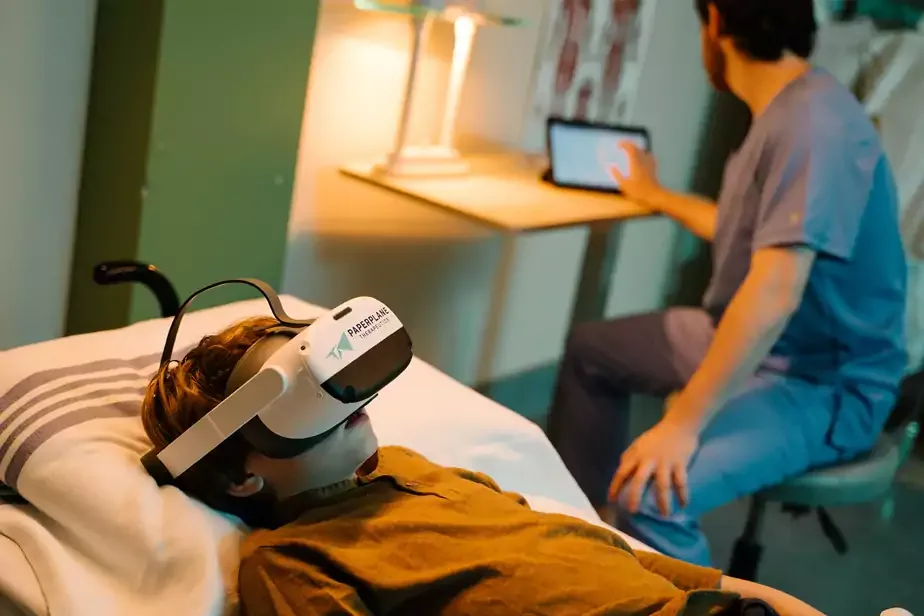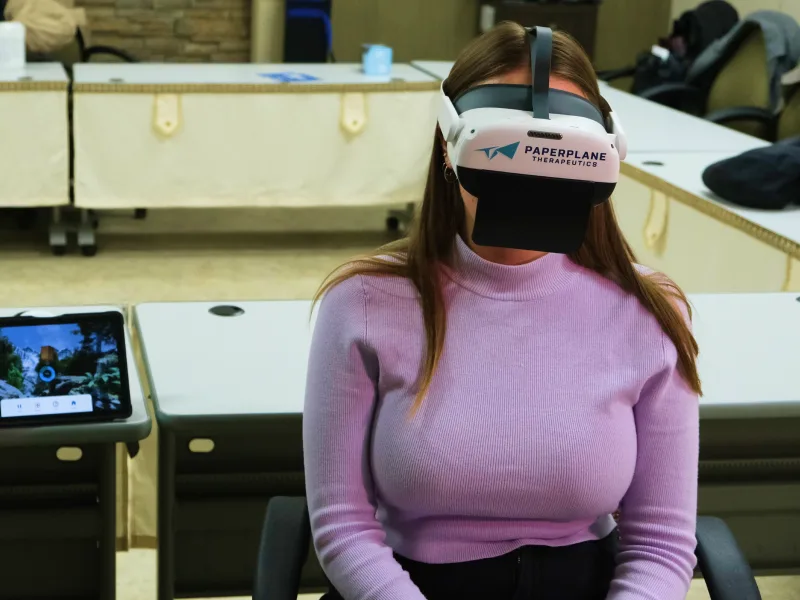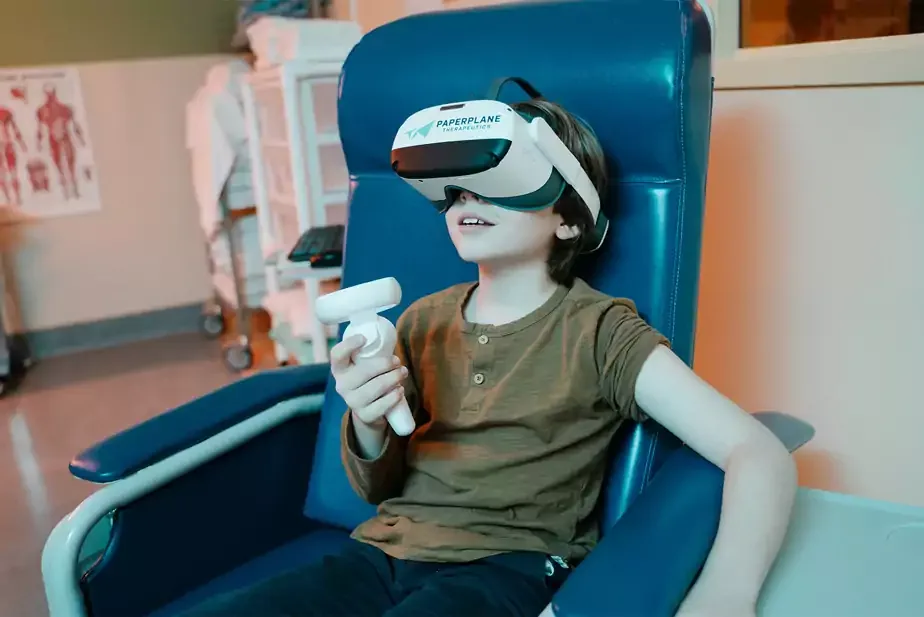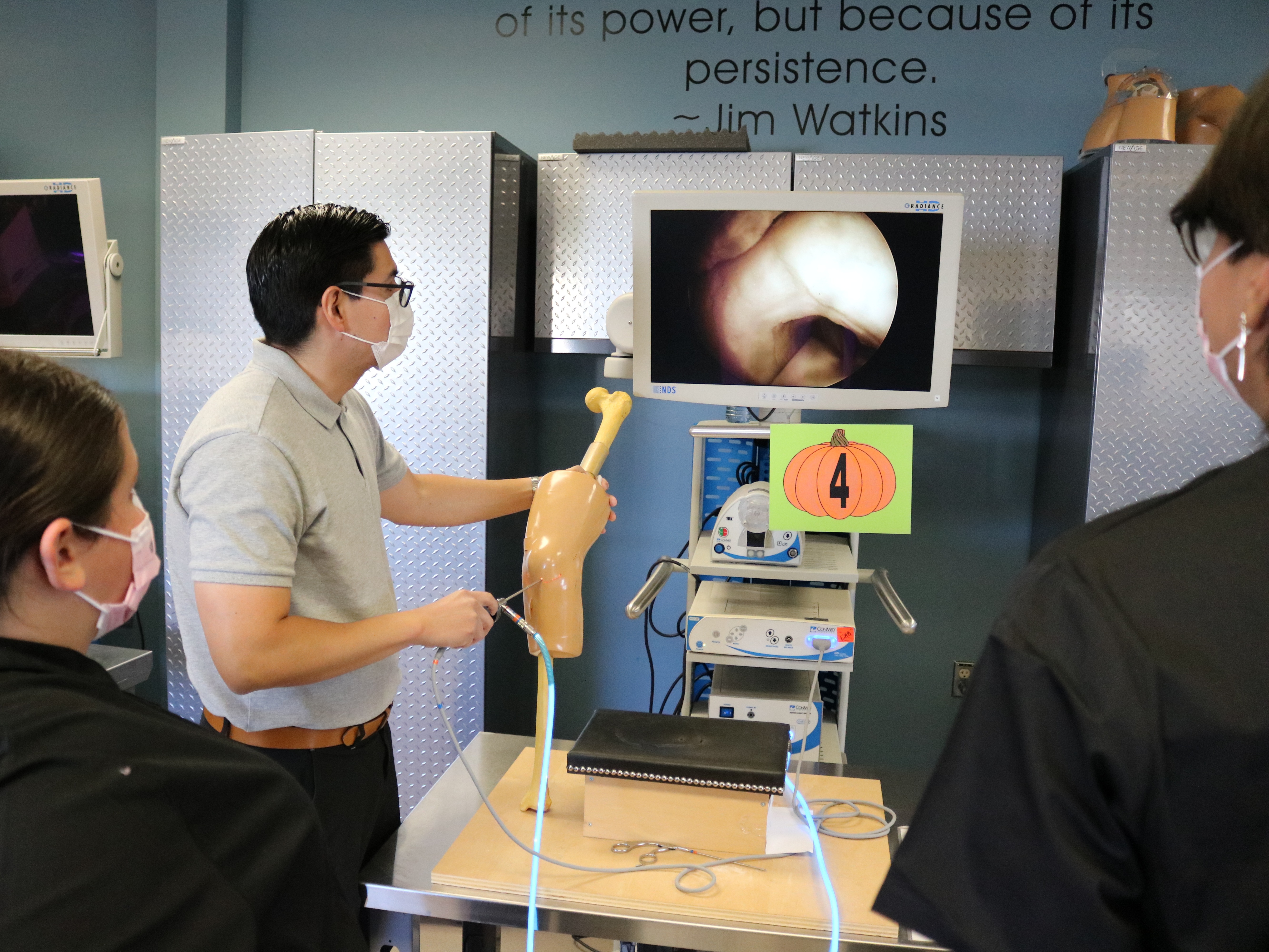
Health
Innovative VR therapy to meet the growing need for mental health services
May 11, 2023
Virtual reality has arrived at the Hôpital d’Alma in Quebec’s Saguenay-Lac-Saint-Jean region to reduce anxiety following a collaboration between the
Fondation de l'Hôtel-Dieu d'Alma
, Paperplane Therapeutics
and TELUS.Ask anyone who has undergone a medical procedure – from getting a needle to going into surgery – and most will agree that pain and anxiety can be
difficult to manage
.Jean-Simon Fortin
has seen this struggle time and again in his career as a child and adolescent emergency physician at the Centre Hospitalier Universitaire Sainte-Justine
. “Surgical procedures, injections, and setting broken bones can be painful and stressful, and managing that pain and anxiety ineffectively can lead to greater apprehension about medical care in the future,” explains Dr. Fortin, now co-founder and CEO of
Paperplane Therapeutics
.In search of effective solutions for managing patient pain and stress, Dr. Fortin teamed up with
David Paquin
, a professor in new media at the University of Quebec in Abitibi-Témiscamingue. Together, they launched Paperplane, a business that designs therapeutic virtual reality environments specifically to help patients reduce their stress and pain levels during medical procedures and improve their well-being in the long run. They collaborate with Sylvie Le May, Full Professor and researcher specialized in pediatric pain at CHU Sainte-Justine, for clinical validation of these therapies.
Rather than being in a treatment room at a hospital, the patient may find themselves in a calm and soothing environment with content specifically designed to stimulate the brain in such a way as to reduce stress and pain. For teenagers and adults, breathing detectors attached to the headset also allow for the integration of deep breathing exercises into the session, reducing the patient’s stress level even further.
“If a nurse has to insert an IV into a vein, it’s easier if the patient is relaxed or if the young person’s attention is elsewhere. The headset helps to make procedures more successful,” Dr. Fortin adds.
Reducing drug prescriptions
At the Hôpital d’Alma, virtual reality headsets are being used as part of a pilot project in mental health launched in 2022 through a collaboration between Paperplane Therapeutics, the Fondation de l’Hôtel-Dieu D’Alma and TELUS.

“We were looking for an innovative way to bring a modern touch to psychiatric care, and of course to have a positive and concrete impact on patients’ mental health. I was excited to see the first steps of the project unfolding with TELUS,” says Jean Lamoureux, CEO of the Fondation de l’Hôtel-Dieu d’Alma.
The virtual reality project has already shown positive results.
Dr. Luc Cossette
, head of psychiatry services, uses Paperplane’s technology by combining it with magnetic stimulation therapy
, a non-invasive process that takes just a few minutes to depolarize certain neurons in cases of severe depression. “Before using magnetic stimulation, we first need to get the patient into a relaxed state. So these headsets are a dream tool for us,” explains Dr. Cossette.
Clinical studies at CHU Sainte-Justine showed
conclusive results
, 80 per cent of patients felt less anxiety during the medical procedure, and 50 per cent of them felt a significant reduction in pain, while 30 per cent felt no pain at all. Another benefit is a reduction in the need for prescriptions of pain or anxiety medications.Dr. Cossette has seen an increase in the number of young people coming into emergency since the emergence of COVID-19. A
study at the Université de Sherbrooke
found that nearly half of young people in Quebec presented worrisome signs of generalized anxiety in 2021.“There aren’t many methods for helping a patient who’s experiencing pain or anxiety. Prescription drugs are the most common approach. The problem is, those drugs have side effects. The person may become less receptive to treatment, they may get drowsy and there may be an impact on their sleep patterns. With the headsets and associated technology, we can go beyond diagnosis and enable the patient to play an active role in their treatment while reducing our use of medications,” says Dr. Cossette.
Transforming healthcare
The
ongoing evolution of 5G networks
will also drastically change the virtual reality experience. One of the greatest current challenges involves latency, or the delay between signals sent and received over long distances. These delays can cause dizziness or nausea. By processing the data close to the 5G networks through edge computing
, Paperplane Therapeutics and TELUS will continue to develop VR technology to create even more immersive experiences, even allowing patients to interact with the environment.
TELUS is also testing connected healthcare solutions to remotely connect first responders to emergency room physicians or allow surgeons to monitor operations remotely through connected devices.
TELUS’ $220 billion investment in its infrastructure, business activities and spectrum licences means
80 per cent of Canadians now have access to the 5G network
, and the company is working to deploy the 3500 MHz spectrum to vastly boost speed and responsiveness.The emergence of 5G technology will also open the door to expanded use of virtual reality headsets at the Alma hospital centre. While the current focus is on anxiety, Dr. Cossette firmly believes that technology and virtual reality will offer an infinite range of possibilities for psychiatry: “This technology could be used to address post-traumatic stress syndrome or social anxiety, in particular with progressive immersive exposure. Take a fear of crowds, for example. We could run simulations of gradually increasing intensity in a hospital setting. The only limit is what the system is programmed to do.”
Beyond treatment and healing
Two psychiatrists recently joined the Alma medical team, intrigued by the technological advances underway at the hospital centre. The virtual reality headsets also help to strengthen the range of care available in the region.
“The benefits of this project go well beyond treatment and healing. Having care available in our region means that people don’t have to go elsewhere for care. This technology puts our local communities on an equal footing with urban centres. It shows that we can be right out there at the cutting edge,” notes Lamoureux.
Looking forward, Dr. Fortin hopes that this project will draw attention from even more healthcare providers.
“My desire to take on the issue of kids’ pain and anxiety has allowed us to create an environment in which patients feel confident, to reassure their families, and to improve the health care staff’s work,” he says. “This project at Alma gives me a different way to pursue my career as an emergency room doctor, and to take part in the transformation of healthcare.”


